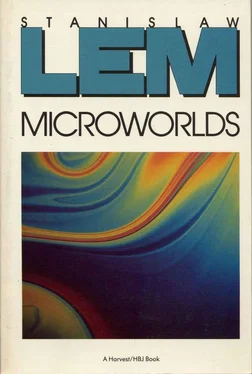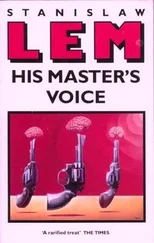“To My Readers,” Poland, no. 225 (May 1973): 6-9.
“Todorov’s Fantastic Theory of Literature” (“Tzvetana Todorova fantastyczna teoria literatury”), Teksty 5, no. II (1973); as “Tzvetan Todorovs Theorie des Phantastischen,” Quarber Merkur 34 (July 1973); in English: Science-Fiction Studies I , no. 4 (Fall 1974): 227-237.
“Unitas Oppositorum: The Prose of Jorge Luis Borges” (“Unitas Oppositorum: Das Prosawerk des J. L. Borges”), Quarber Merkur 24 (January 1971); in English: Science Fiction Commentary, no. 20 (April 1971): 33-38, Reprinted in edge, nos. 5/6 (Autumn/Winter 1973): 99-102.
“Amazing Interview: A Conversation with Stanislaw Lem,” by L. W. Michaelson, Amazing Science Fiction Stories 27, no. 10 (January 1981): 116-119.
“The Future Without a Future: An Interview with Stanislaw Lem,” by Zoran Zivkovic, Pacific Quarterly 4, no. 3 (July 1979): 255-259.
“An Interview with Stanislaw Lem,” by Anne Brewster, Science Fiction 4, no. I (n.d.): 68.
“An Interview with Stanislaw Lem,” by Peter Engel (with John Sigda), The Missouri Review 7, no. 2 (1984): 218-237.
“An Interview with Stanislaw Lem,” by Raymond Federman, Science-Fiction Studies 10, no. 29 (March 1983): 2-14.
“Knowing Is the Hero of My Books,” by Andrzej Ziembicki, Polish Perspectives, 22, no. 9 (September 1979): 64-69.
“Lem: Science Fiction’s Passionate Realist,” by Peter Engel, The New York Times Book Review, March 20,1983, pp. 7, 34-35.
“Promethean Fire: An Interview with Stanislaw Lem,” Soviet Literature 5, no. 239 (1968): 166-170.
“Stanislaw Lem — an Interview,” by Daniel Say, Entropy Negative, no. 6 (1973): 3-24 (unnumbered). Reprinted, as “An Interview with Stanislaw Lem,” in The Alien Critic 3, no. 10 (August 1974): 4-14.
“Stanislaw Lem: The Profession of Science Fiction XV: Answers to a Questionnaire,” Foundation, no. 15 (January 1979): 41-50.
“You Must Pay for Any Progress: An Interview with the Polish SF Writer Stanislaw Lem,” by Bozena Janicka, Science Fiction Commentary, no. 12 (June 1970): 19-24. Reprinted from Sovetskaya Kultura, November 30, 1968.
June 24, 1970. Science Fiction Commentary, no. 14 (August 1970): 5-6, 20.
January 13, 1972. Science Fiction Commentary, no. 26 (April 1972): 28-29.
“A Letter to Mr. Farmer.” Science Fiction Commentary, no. 29 (August 1972): 10-12.
May 7, 1972. Science Fiction Commentary, no. 29 (August 1972): 9, 43-44.
September 9, 1974. Science Fiction Commentary, nos. 41/42 (February 1975): 90-92.
“In Response” (to criticism of his “Todorov’s Fantastic Theory of Literature”). Science - Fiction Studies 2, no. 6 (July 1975): 16-17.
“In Response (to Professor Benford’s remarks on Lem’s essay “Cosmology and Science Fiction”). Science-Fiction Studies 5, no. 14 (March 1978): 92-93.
February 6,1980. Science Fiction Commentary, nos. 60/61 (June 1981): 4.
“From Big Bang to Heat Death,” extract from “Von Wissenschaft und Pseudowissenschaft,” Quarber Merkur 52 (January 1980); in English: Second Look 2, no. 2 (January-February 1980): 38-39. On Paul Davies’s The Runaway Universe.
“Lost Opportunities” (“M. K. Josephs Roman The Hole in the Zero”), Quarber Merkur 27 (July 1971) and untitled review, Quarber Merkur 25, (January 1971); in English: Science Fiction Commentary, no. 24 (November 1971): 17-24. On The Hole in the Zero by M. K. Joseph, and The Left Hand of Darkness by Ursula K. Le Guin.
“Only a Fairy Tale,” untitled review in Quarber Merkur 31 (July 1972); in English: Science Fiction Commentary, no. 51 (March 1977): 8-9. On Robert Silverberg’s A Time of Changes.
“On Science, Pseudo-Science, and Some SF” (“Von Wissenschaft und Pseudowissenschaft”), Quarber Merkur 52 (January 1980); in English: Science-Fiction Studies 7, no. 22 (November 1980): 330-338. On Other Senses, Other Worlds by Doris and David Jonas; Computer Power and Human Reason: From Judgement to Calculation by Joseph Weizenbaum; Worlds in Collision by Immanuel Velikovsky; Lifetide: The Biology of the Unconscious by Lyall Watson; The Martian Inca by Ian Watson; The Crash of Seventy-Nine by Paul Erdman; and The Third World War: August 1985 by Sir John Hackett.
“Robbers of the Future” (by Sakyo Komatsu), review in Quarber Merkur 27 (July 1971); in English: Science Fiction Commentary, no. 23 (September 1971): 17-18.
“The Space Flight Revolution” (by William Sims Bainbridge), Science-Fiction Studies 6, no. 18 (July 1979): 221-222.
“Two Ends of the World” (by Antoni Slonimski), review in Quarber Merkur 57 (July 1982); in English: The Missouri Review 7, no. 2 (1984), pp. 238-242.
“Reflections on My Life,” The New Yorker, January 30, 1984, copyright © 1984 by Stanislaw Lem; reprinted by permission. “On the Structural Analysis of Science Fiction,” Science-Fiction Studies, Spring 1973, copyright © 1973 by R. D. Mullen and Darko Suvin. “Science Fiction: A Hopeless Case — with Exceptions,” Science Fiction Commentary, July-September 1973, copyright © 1972 by Stanislaw Lem and Franz Rottensteiner. “Philip K. Dick: A Visionary Among the Charlatans,” Science-Fiction Studies, March 1975, copyright © 1975 by R. D. Mullen and Darko Suvin. “The Time-Travel Story and Related Matters of Science-Fiction Structuring,” Science-Fiction Studies, Spring 1974, copyright © 1974 by R. D. Mullen and Darko Suvin. “Metafantasia: The Possibilities of Science Fiction,” Science-Fiction Studies, March 1981, copyright © 1981 by SFS Publications. “Cosmology and Science Fiction,” Science-Fiction Studies, July 1977, copyright © 1977 by R. D. Mullen and Darko Suvin. “Todorov’s Fantastic Theory of Literature,” Science-Fiction Studies, Fall 1974, copyright © 1974 by R. D. Mullen and Darko Suvin. “Unitas Oppositorum: The Prose of Jorge Luis Borges,” Science Fiction Commentary, April 1971, copyright © 1971 by Stanislaw Lem and Franz Rottensteiner. “About the Strugatskys’ Roadside Picnic,” Science-Fiction Studies, 1983, copyright © 1983 by SFS Publications.
Requests for permission to make copies of any part of the work should be mailed to: Permissions, Harcourt Brace Jovanovich, Publishers, Orlando, Florida 32887.
Library of Congress Cataloging in Publication Data
Lem, Stanislaw.
Microworlds: writings on science fiction and fantasy.
“A Helen and Kurt Wolff book.”
Bibliography: p. 279
1. Science fiction — History and criticism — Addresses, essays, lectures. 2. Fantastic fiction — History and criticism — Addresses, essays, lectures.
I. Rottensteiner, Franz. II. Title.
PN3433.8.L4 1984 809.3’876 84-12837
ISBN 0-15-159480-5
ISBN 0-15-659443-9 (Harvest/HBJ : pbk.)
Designed by Mark Likgalter
Printed in the United States of America
First Harvest/HBJ edition 1986
A B C D E F G H I J
Michel Butor once expressed the opinion that a team of science-fiction writers should cooperate in the construction of a fictitious world, because such an undertaking is beyond the powers of any single individual. (This was supposed to explain the poor quality, the one-dimensionality of the existing science fiction.) I did not take those words of Butor’s seriously when I read them. And yet I have, although many years later and by myself, tried to realize the basic essence of this idea as described above. And in Borges, too — in his “Tlön, Uqbar, Orbis Tertius” — you can read of a secret society that creates a fictitious world in all its particulars, with the intent of turning our world into the imagined one.
Читать дальше












